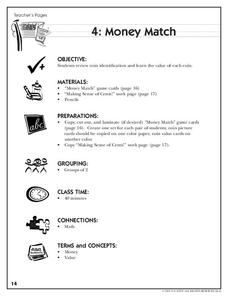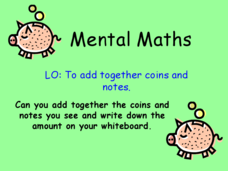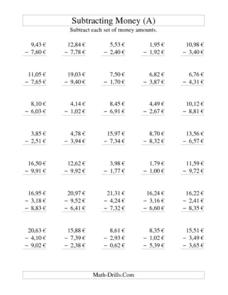Curated OER
Working with Coins
Count the correct change with a money math worksheet! Given certain coins, second and third graders add and subtract amounts of money to find the correct change. The worksheet uses pennies, nickels, dimes, quarters, half dollars, and...
Curated OER
Money
Which coins do you need? Scholars are faced with a challenge: using only three coins they must find the exact amount needed for six items. The coins are standard US currency and are pictured at the top, however their value is not listed....
Curated OER
Rounding Money
Simplify money math with these 27 rounding practice problems, split into three sections. For the first part, scholars round nine money amounts to the nearest dollar. The next second has them round to the nearest 10 dollars, and finally...
DK Publishing
Money Word Problems #1
Having money problems? How about 19 more? Scholars begin with 10 money-related word problems, some requiring they understand different coin values. They add and subtract for these, and although there are also opportunities for division...
Curated OER
Who Has More Money?
Coloring and money combine in this fun instructional activity! First and second graders count the amounts of money represented in each, and then color the person or animal who has the most money. They then draw the correct coins to add...
Curated OER
Counting Coins
Practice counting money in this helpful instructional activity. Young consumers add four separate sets of coins, and then determine how much more money they need to reach a certain amount. Pictures of coins are provided, making this...
Curated OER
Stamping Coins
Learners demonstrate that they can use a variety of coin combinations to make a single amount. They study all the ways to make 50 cents using coins using different coins.
Curated OER
Adding Money
Show young economists that adding money is just like adding the numbers they are used to. They complete two addition tables, adding monetary values under 50 cents. There are a couple done for them to give guidance, but learners must...
Curated OER
Close Observation: Coins
Integrate math, science, and speaking/listening with a collaborative hands-on activity. Each group works with a single penny, examining it with the naked eye and recording observations. Repeat using magnifying glasses. Then repeat with a...
Curated OER
Working with Money
How much money do you have? Scholars add up dollars and cents to get totals for 12 visual addition problems. They look at pictures of the currency and write the total numerically (remember that dollar sign). Although the coin images look...
Curated OER
Money
Converting money is both practical and an excellent gateway into future math concepts, and scholars get plenty of practice here! There are four sections, each with 12 values for them to convert. First, they change cent values into...
Curated OER
Identifying Coins and Their Value
Use the special Tennessee State Quarter as a learning tool. During this lesson, discuss why the Tennessee Quarter has musical instruments on it. You can also utilize a worksheet embedded in the plan to help your class compose a song that...
Curated OER
Money Match
Playing a game can be educational, pupils use this matching activity to identify coins and their values. This is a great way to have learners practice their money sense.
Curated OER
Mental Money Addition
Counting money is fun for kids, increases their understanding of addition, and applies mathematics to real world situation. Here are five opportunities for learners to count up their pence and pounds to see how much money they have. Tip:...
Math Drills
Subtracting Money (A2)
Work with money math in subtraction worksheet. With 35 subtraction problems in column format, the assignment is a good resource for review, new skills, or for assessment.
Curated OER
Counting Money
Money is always a source of interest for young mathematicians, so utilize their engagement by adding up coin values. For each set of coins (quarter, dime, nickel, and penny) scholars count up and write the total. The example has them...
Curated OER
Real-life Problems: Dollars and Cents
Do your fourth graders love money? They'll solve these money math word problems with ease! Six word problems involving money prompt pupils to use addition, subtraction, multiplication, and division. A section for work reinforces the...
Math Drills
Subtracting Money (A)
Whether you need a simple math drill or a review lesson on money math, a straightforward instructional activity will challenge even your most advanced math learners. With 35 subtraction problems featuring one- and two-digit numbers,...
Curated OER
Estimating Sums of Money
By rounding, scholars find that adding money amounts becomes a breeze! They round two and three-digit numbers (with decimals) in these addition problems to get approximate sums. For each, mathematicians write the new addition equation...
Curated OER
Estimating Differences of Money
When it comes to money math, show scholars that estimation is their best friend. They round money values to the closest dollar, 10 dollar, and 100 dollar increments, solving 19 addition and subtraction problems with approximate answers....
Curated OER
Barter vs. Money
First graders listen to the book, Sheep in a Shop, that leads them to think about making financial decisions, trading, and the barter system. After the book is read aloud, a discussion ensues about some of the things that the sheep...
Scholastic
Study Jams! Compare Money Amounts
Elementary money makers are walked through five steps to compare two different amounts. RJ speaks slowly as animations display his explanations. He compares the price of a New York magnet to the amount of money his cousin has on hand to...
Youthlinc
Financial Literacy: Money Attitudes Lesson Plan
Going once, going twice, sold! An auction provides class members with an opportunity to examine their attitudes toward money. After bidding on and purchasing items, individuals complete an attitude survey and then identify a...
Curated OER
Money Math
Is there a better, and more motivating, math manipulative than money? Kids love to use it, and it's a great teaching tool. Here, there are three good activities using coins. Learners create patterns, sort change, and have a...

























